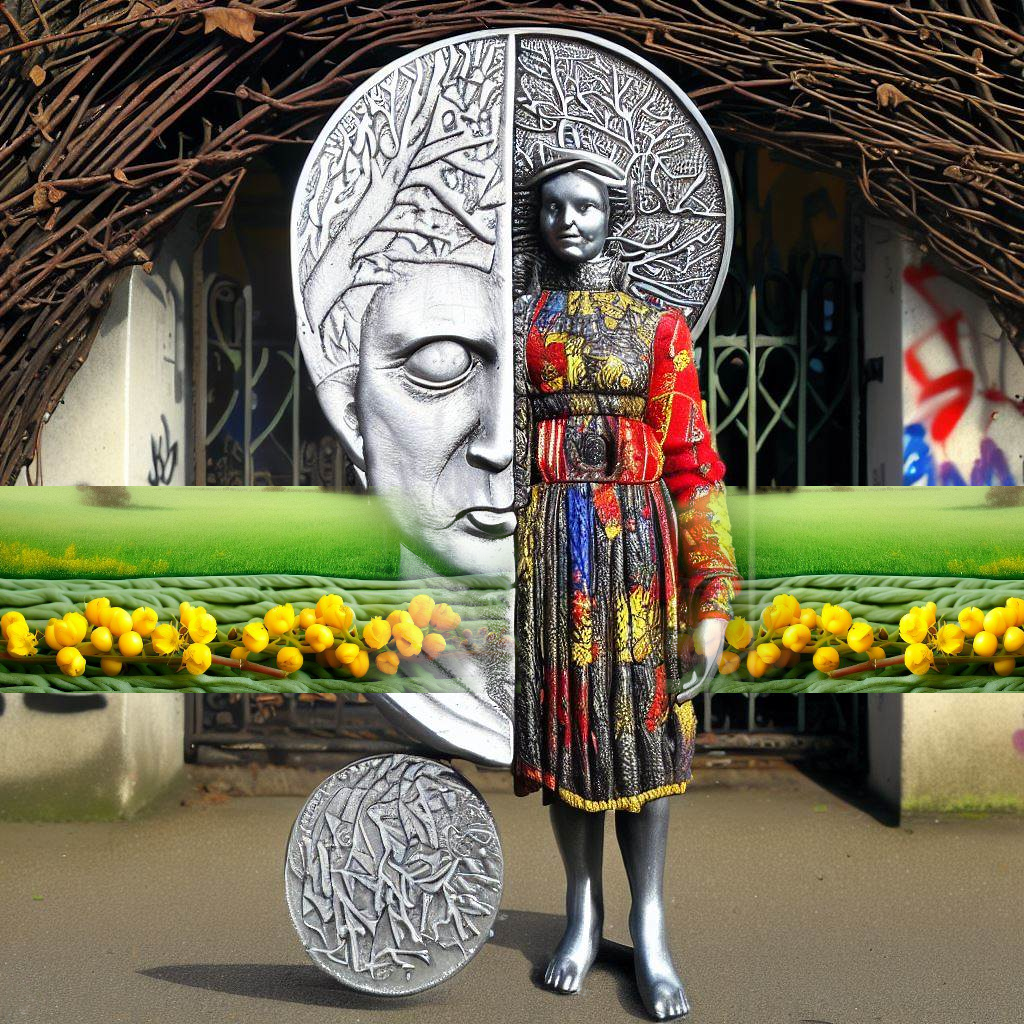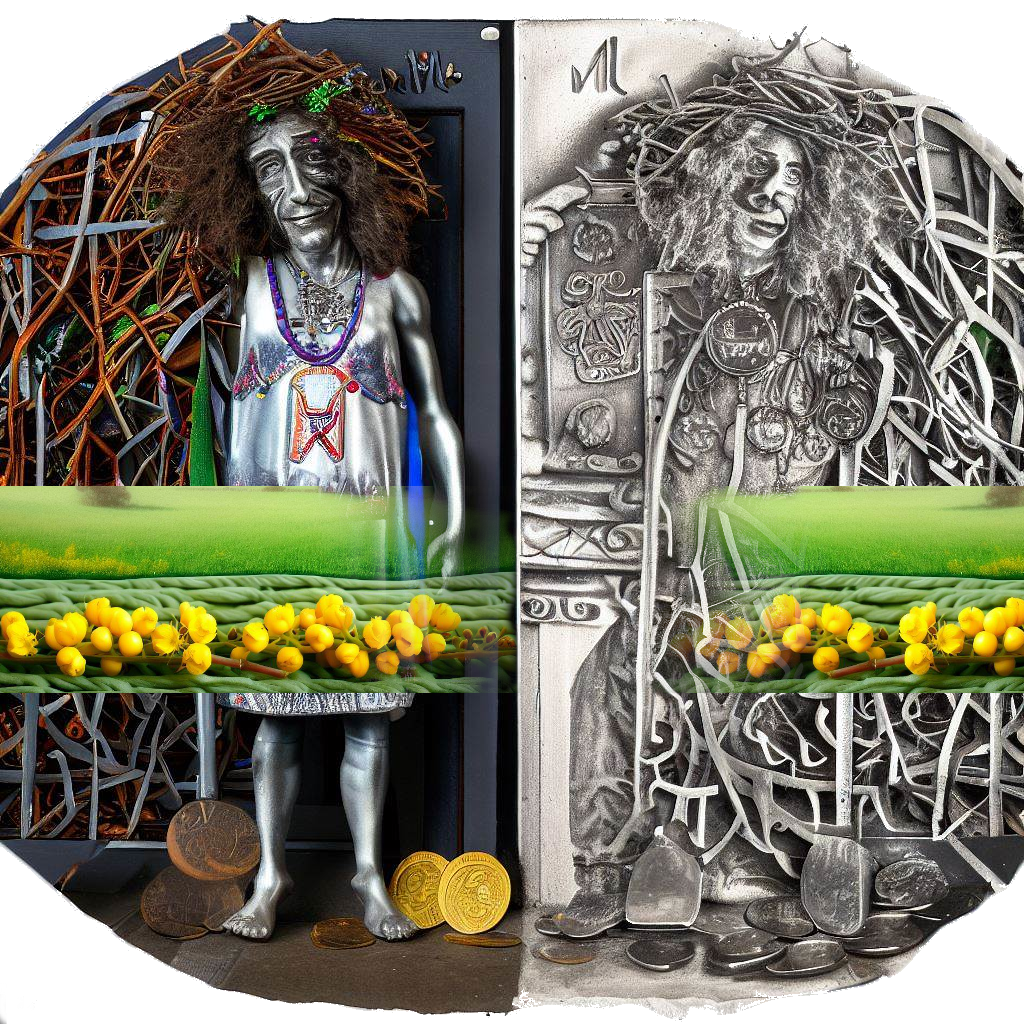The Janus Ratio : making sense of the gap we pivot on to (self/world)

In a few comments elsewhere I have started using the term Janus ratio, to describe our threshold of attention, the gate on which it pivots is the urge to live. I’ll try to make sense of it, by some attempts at definition of this neologism, below.

Janus ratio of self and world © 2023 meika loofs samorzewski
The Janus ratio describes the proportions of attention we each direct within and without, consciously and/or conscientiously.
A ratio is an ordered pair of numbers a and b, written a / b where b does not equal 0.
So the Janus ratio is named after the two-face god Janus who looks both ways over/through a threshold and so names the first month of the Roman calendar, January.
I argue that to live is to pivot on the threshold between the self and the world. To live is to face in and out. The self and the world are outcomes of the same process.
That is, to live as human animals hinges on the point of view where we look out from the body, and from this looking out for oneself, one can become able able to look in and so, attend to “looking in” for oneself.
To attend is to live. I suspend judgement on how this is done, either for life or consciousness.
This suspension is why I bracket or blur with a slash to (world/self). To call this a ratio is to overlay a functional overloading of the original function/metaphor in using a suspension of judgement (Pyrrhonistically). This overloading use is not Pyrrhonistic as far as I know, (I also have to look up Husserl’s bracketing again now that I’ve read Iris Murdoch on his 'flippant Buddhism' (see Metaphysics as a Guide to Morals London: Chatto & Windus, 1992). I’ve only known about this bracketing through Derrida someplace).
It is the world that mediates reality, and where in hindsight we discover things like logic, such that some of us think we have discovered or recollected something, rather than having made or done something. Some then call this, the world¸ —a cave.
How any of this relates to reality will be the subject/object of another post.
As we live in a world around us as much as we live in a body that lives in the world, we can treat either as the other. Not because they are the same, but because we live, and that is how we tend to nose around, and make-do (overload).
This living to (self/world) is a ratio because it changes focus in attention or intention as we tend through the day, and move through our lives. Where the focus lies gives us a sense of our self, a sensation of self, or of the world, as well as our self in the (our) world. It’s not neat.
A ratio is better metaphor than a spectrum because one is not located on the spectrum someplace. Perhaps a focus is locate-able on a spectrum, but the point-of-view is not the focus, the point-of-view is the whole thing, and is what the ratio adds up to. For many of us it adds up to 1, for some humans it adds up to zero, and them folks may not be in any relationship one might describe as a ratio, and so are not reasonable.

One of the ways to describe the facts of our existence is to label an avenue of experience as subjective (me) and another avenue of experience which is classed as not-me (the other) as objective. This has something to do with Kant.
There are whole theological philosophies based on trying to link the two by guessing belief over the gap, or thrown into the gap, a gap which may not even exist. It might be an artefact of linguistic attention, and hingsight, an artifact of time, especially if neither actually 'really' exist. Regardless we survive by living as if they do exist.
Another gap.
And one of the outcomes of this, perhaps false dichotomy, is to label how we cross the gap from one to the other as the hard problem, between consciousness and not-me reality (and what we know of it).
So much material one can get LLMs to chat about it. Hard sell: ChatGPT vs. Claude on the hard problem of consciousness is a recent example.
This would be all well and fine if there were only one consciousness and its lone reality, but the world mediates between the two, such that the world is given me, which means it is also given you, and fractally, the world is given the world by each of us being given, joint and severally. If not collectively.
Until we know what the answer is to the hard problem, or that there is a hard problem and it is not a false dichotomy (perhaps because it is (not)gaps all the way down), it might be better to suspend judgment in a Pyrrhonistic way, or even bracket the issue with a blurring slash, and to use a verb to do this.
To (self/to world) or to (self/world).
Because we live on regardless.
In effect this ignores the distinction between world and reality, where reality is an objective set of objects.
Because we live on regardless.
To world here is a spectrum of soft and hard attributes of interaction (the world does not exist as a hard objective objecty object but as a mediation of that hardiness and me & you, as indeed the world mediates between me and you, (the world of all those me-s who are you-s to each other). So many others that we, of course, can talk about an intersubjective compromise which is the reality we world our lives in —interpersonally.
So I suspect in intrigued suspensefulness, that in large part the hard problem is an artefact of language, especially languages that use who-says-what structures. Pronouns are the gift that gives too much.
So it might be more true to say to (self/world):reality. (Not a great proportion I know).
Where "(self/world):reality" is a spectrum of subjectivity me, me-s, you, you-s, family, band, tribe, city, empire, through to reality, and beyond which there is no one to experience it.
So we guess that bit, and use science to test it all.

To (self/world) == to live while acknowledging our bodies live in a contested reality we world in, as well as where we self. That to self and to world are the same activity with different foci, Janus-like gazing, one inward, one outward, and while two-faced we seek to align them as we have the one point-of-view, either from a sense of self, or from a self of the world. Both are "proper".
It’s possible that reality retreats as the world expands by way of science and technology.
We also often get confused about all this, say it it is all too hard, and make stuff up to suit our purposes, but not our worlding, and call that reality, because I say so.

Orginally posted on substack 2024-09-13.
